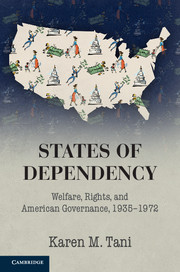Book contents
- Frontmatter
- Dedication
- Contents
- List of figures and tables
- List of gallery images
- Acknowledgments
- Introduction
- PART I 1935 TO 1949
- 1 A New Deal for Poor Relief? The Modern American State and the Endurance of the Local
- 2 Rights as an Administrative Tool: An Appeal to State and Local Bureaucrats
- 3 Rights as a “Live, Motivating Principle”: The Path toward Legalism
- 4 Claiming Welfare Rights: Fair Hearings, State-Court Claims, and a Forgotten Federal Case
- PART II 1950 TO 1972
- Conclusion
- Notes
- Selected Bibliography of Primary Sources
- Index
- Plate section
4 - Claiming Welfare Rights: Fair Hearings, State-Court Claims, and a Forgotten Federal Case
from PART I - 1935 TO 1949
Published online by Cambridge University Press: 05 April 2016
- Frontmatter
- Dedication
- Contents
- List of figures and tables
- List of gallery images
- Acknowledgments
- Introduction
- PART I 1935 TO 1949
- 1 A New Deal for Poor Relief? The Modern American State and the Endurance of the Local
- 2 Rights as an Administrative Tool: An Appeal to State and Local Bureaucrats
- 3 Rights as a “Live, Motivating Principle”: The Path toward Legalism
- 4 Claiming Welfare Rights: Fair Hearings, State-Court Claims, and a Forgotten Federal Case
- PART II 1950 TO 1972
- Conclusion
- Notes
- Selected Bibliography of Primary Sources
- Index
- Plate section
Summary
“Dear Sir and to Whome is Implicated in Wellfare of the Real need of those in a Pitifull condition,” began one 1941 letter to a state welfare department in the Midwest, “I need help.” This humble petition, which resonates so well with dominant characterizations of welfare recipients in this era, stands in sharp contrast to the rights language documented in the preceding chapters, a language that federal administrators pumped deliberately and determinedly into public welfare operations around the country. The juxtaposition raises a question: When the New Deal restructured American poor relief – ushering in statewide public assistance programs with clear eligibility requirements and explicit procedural protections, all tethered to federal and state statutes – did poor individuals adjust their own posture accordingly? Did they assert the various welfare rights that federal administrators insisted they had? We have long assumed that they did not – that although poor Americans actively applied for public assistance, and accepted it when offered, they rarely made the sort of claims on public authority that we associate with rights; when they did, the standard story continues, government officials quickly and firmly put them in their place.
Poverty law scholars are largely responsible for crafting and spreading this narrative, starting with Social Security Board lawyer A. D. Smith and continuing with welfare rights advocates and theorists Edward Sparer and Charles Reich, from whom so many subsequent scholars borrowed. One of their prime examples is the colorful case Wilkie v. O'Connor (1941), involving an Old Age Assistance claimant from Seneca County, New York, who “insist[ed]” on “sleep[ing] under an old barn, in a nest of rags” reachable only by “crawl[ing] upon his hands and knees.” Local officials offered David Wilkie more “suitable living quarters” and even an increase in his monthly assistance payment, but he refused to abandon his chosen abode. Finally the county welfare department revoked his grant. Wilkie responded by bringing a mandamus action in the county court: his monthly OAA check of $24.50 was a “reward” for a life well lived, he claimed; the county welfare commissioner was obligated to give it to him. The county court disagreed, as did the state court to which Wilkie turned next.
- Type
- Chapter
- Information
- States of DependencyWelfare, Rights, and American Governance, 1935–1972, pp. 113 - 150Publisher: Cambridge University PressPrint publication year: 2016



